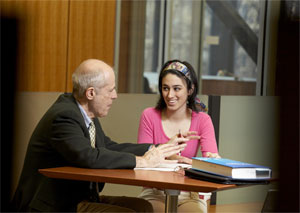
Government and law major performed independent research under the guidance of Stephen E. Lammers, Helen H.P. Manson Professor of the English Bible
In 2004, President George Bush’s support among Hispanic men increased 12 percent over the 2000 election. During the six weeks leading up to the 2004 election, the Republican Party distributed a DVD to many Hispanic households. This three-minute DVD featured George Bush speaking in Spanish along with a montage of images dealing with Hispanic history, culture, and community.
As an intern with the Democratic National Committee last summer, Katherine Dranoff ’09 (Bala Cynwyd, Pa.) heard a presentation about Republican strategies to influence voters. The Hispanic-targeted DVD was cited as an example of the GOP’s methods.
“I found it to be really interesting and wanted to pursue it further,” says the government and law major.
Having presented research called, “Determining Discrimination on College Campuses,” at the National Conference of Undergraduate Research (NCUR) in 2006, Dranoff wanted to return to the conference this spring. She decided that an analysis of the Bush DVD and its relation to the increased support among Hispanics would make a good research project for this year’s conference.
“This is one of those subjects that is not easily categorized and it raises issues that are new. It forces the reader to think about the direction political persuasion is taking in this country,” says Dranoff’s faculty advisor, Stephen E. Lammers, Helen H.P. Manson Professor of the English Bible.
Dranoff gave a poster presentation on her research at NCUR in April at Dominican University of California in San Rafael. Approximately 2,200 undergraduates from more than 250 colleges and universities attended the conference.
So far, Dranoff has focused her research on looking at voting trends within the Hispanic community, in particular comparing how Bush’s support among Hispanic voters grew significantly between the 2000 and 2004 elections. Dranoff plans to continue her research this fall with an in-depth analysis of the grammar used in the message. She is also interested in looking more closely at the strategy of directly distributing advertising messages to potential supporters in a low-cost DVD format as opposed to high-cost television advertising.
“Katherine has a project here that crosses disciplinary lines and she worked hard to learn what she needed to know to develop the work. With her background in political science and religious studies and her work in communication, she took up a challenging set of issues. I do not think of this work as finished, at least not yet. When we last met, Katherine was talking about ways of carrying this research forward,” Lammers says.
Dranoff’s work is one example of the many undergraduate research opportunities available at Lafayette.
“Undergraduate research at Lafayette covers a very wide spectrum of things. There is research in which the undergraduate is really a laboratory assistant and there is work where the undergraduate takes the lead on the project. Both are valuable. This is one of those times when the undergraduate took the lead and the faculty member was an advisor and commentator,” Lammers says.
After Lafayette, Dranoff plans to sign up for the Teach for America program for a year, and would then like to go to law school.
Dranoff is again spending her summer as an intern with the Democratic National Committee. At Lafayette, she is the student director for Students for Barak Obama, is a member of the College Democrats, and a member of LEAP (Lafayette Environmental Awareness and Protection).
Independent study projects are among several major programs that have made Lafayette a national leader in undergraduate research. The College sends one of the largest contingents to NCUR each year. Twenty-one students were accepted to present their research at last year’s conference.
